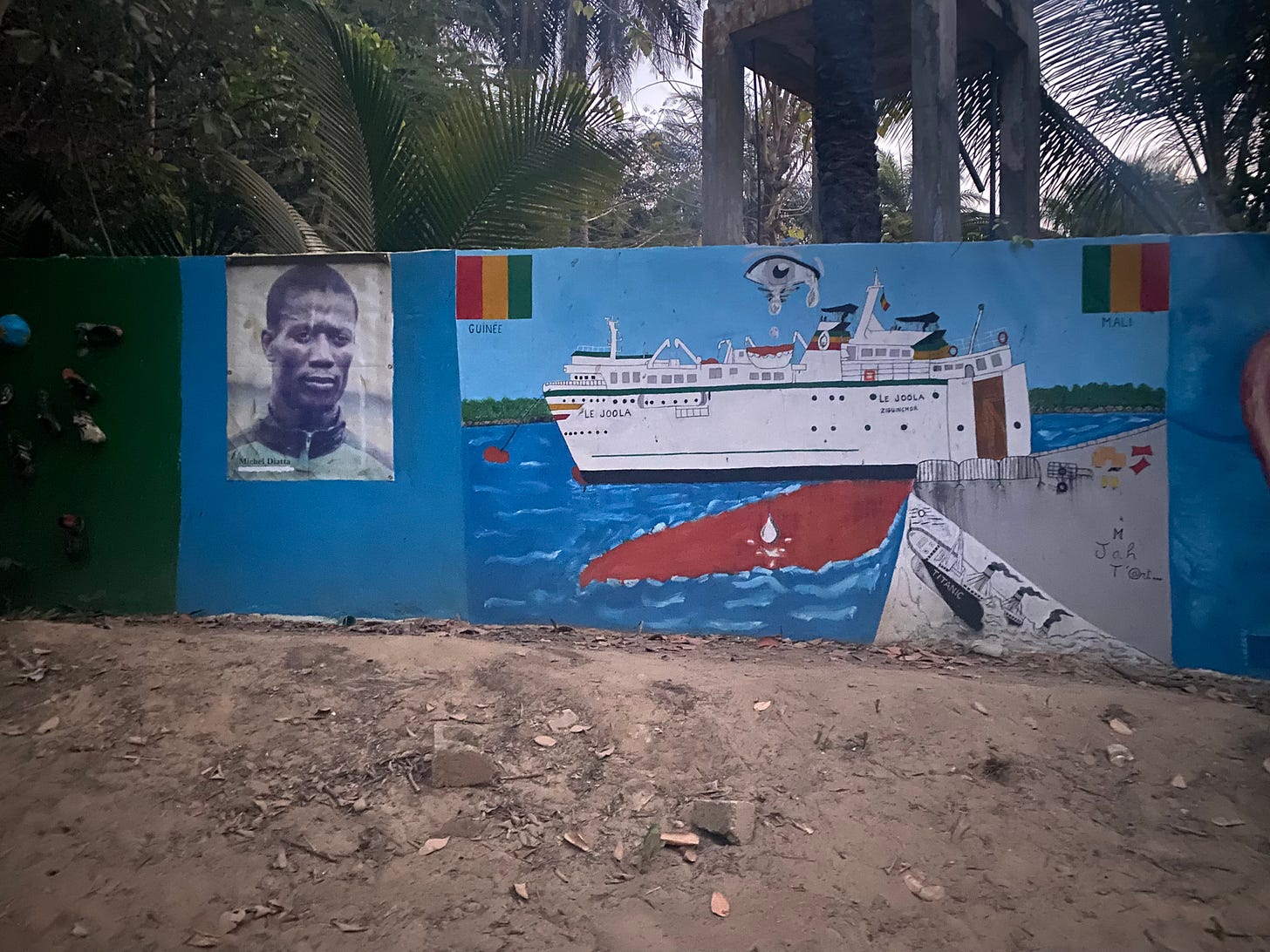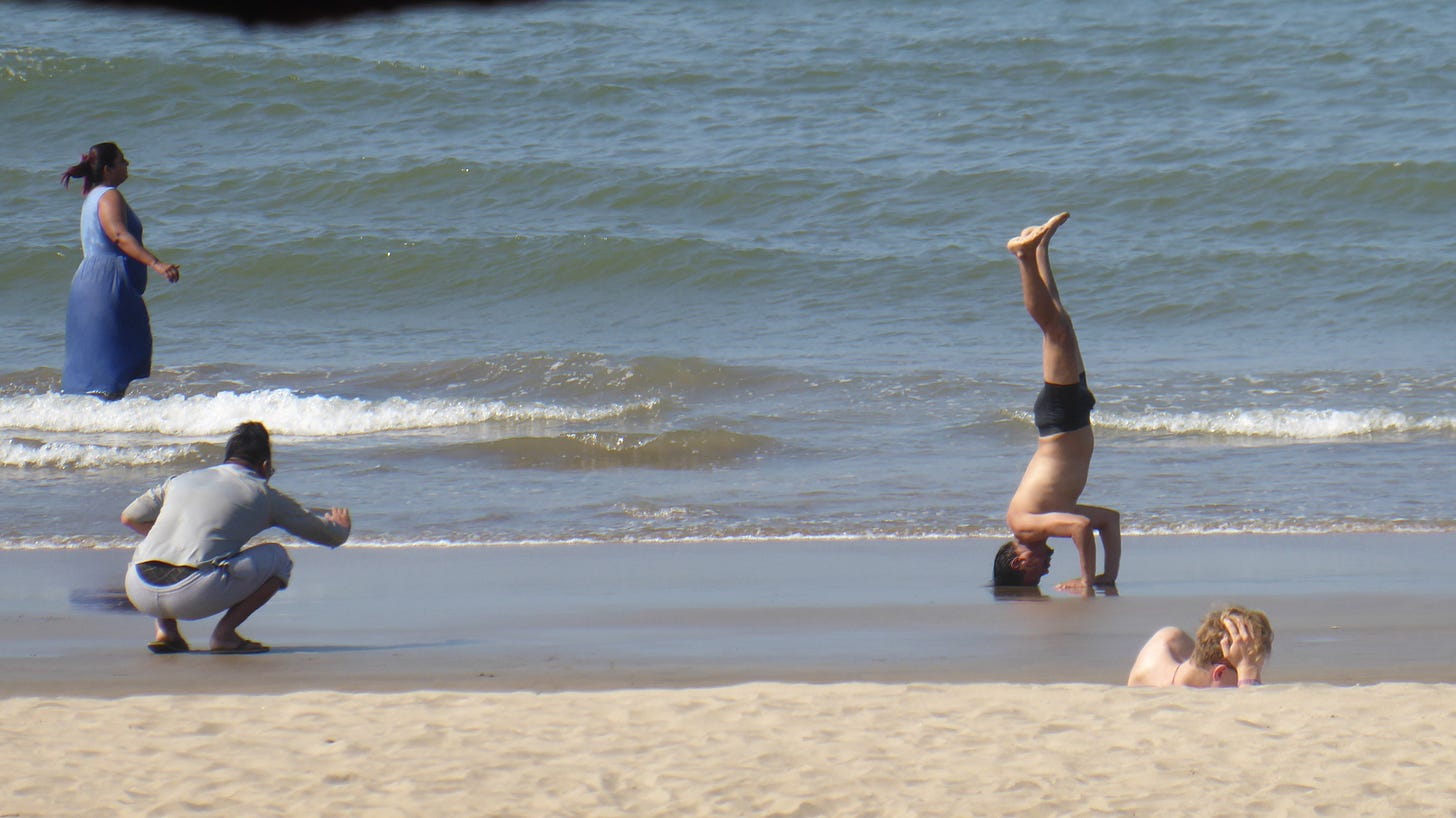Arambol, India, 2020. In a café catering to Western hippies, I witness a young Russian expat accidentally spilling tea on the lap of an Israeli hippie girl. The boy issues a lengthy apology—all in Russian. This infuriates the girl. She cries, “The world has adopted English as the common language, why can’t you f*king go and learn it?”
Has it…? In this essay, I want to tell you about the worlds we don’t see. And how the knowledge of English narrows, instead of broadening, our perspective.
Austria, Late 1980s
I grew up in communist Poland. The incentive to learn English was minimal. Like many other boys, I devoured travel stories from books and dreamed of becoming Indiana Jones. But I never truly believed I could go abroad. We were, de facto, prisoners of our oppressive government, with no money to travel and no passports. Those few who went abroad and returned had to surrender their passports and undergo interrogations by the secret service. So, I learned English without much enthusiasm. But then, a miracle happened. In 1989, against all odds, communism fell. Suddenly and unexpectedly, we were free to roam the world.
My exposure to English began in Vienna, Austria. As a teenager traveling with my aunt on a train, I sat next to a talkative middle-aged American. He asked me something casual—probably my age. But that was the first time a foreigner had ever spoken to me. I was shy, confused, and stressed, and the American accent was so exotic. I remember to this day my mumbled answer: “I don’t speak German.” My aunt laughed.
But then it got better. I took classes, traveled, hitchhiked, volunteered, and eventually wrote my Master’s thesis entirely in English. I lived in the UK and the USA and founded an international IT business. We operated worldwide. Things went well.
Knowledge of English opened amazing opportunities for me and millions of Eastern Europeans from my generation. From prisoners, we became citizens of the world.
Germany, 2005
The first crack—a hint that my perspective was not complete—came when our company decided to seek clients in Germany. Germans, in general, speak excellent English. Partnering with a global vendor, we launched marketing campaigns (in English) and invested in a roadshow at German conferences. After a year, this costly campaign brought two tiny, ephemeral contracts (both those clients later became my friends for life) and no lasting business. And that was after years of successful business in the UK, USA, the Emirates, Malaysia, and Japan. I did not understand.
The analysis showed the following: Germans did business differently. Most companies were family businesses, run by old-school, middle-aged directors. They sought service providers among friends and neighbors. They generally didn’t know about modern Internet technology; many didn’t even read email. They spoke English only if they had to.
And this was Germany, the most westernized of all non-English-speaking countries!
I had to do my homework and learn German (which I eventually did). This time, English not only did not get me anywhere but also locked me in a false belief that people all over the world would think and act the way people in the USA would.
My problem was not English itself, but the cultural legacy it carried. In the process of acquiring fluency in the language, I immersed myself in the Anglo-Saxon culture and adopted it as THE culture.
Spain, 1998
Another crack came a few years earlier, on a student exchange in Madrid, Spain. Learning Spanish was much quicker than English. After three intensive months in Madrid, I could communicate and even, with some help, read newspapers. I made friends with Guido, a fellow student from Uruguay, who would spend Sunday mornings with a newspaper called El País, on a park bench in the beautiful El Retiro Park. I joined in; we read together. Today, many years later, those peaceful mornings with Guido are among my most cherished memories. And once I started following the news that Guido patiently explained, I noticed something peculiar. In Spain, the foreign news came from Venezuela, Mexico, and Argentina. Wait… what about Israel? Well, there were not many news stories from the Middle East. A bus hit by a bomb in Israel is tragic, but why would that be more tragic than the deaths in a landslide in Colombia?
But it was more disturbing to learn that news of a Colombian landslide never made it to the news channels known to me, which generally rebroadcast the main headlines of Reuters and Associated Press. This is characteristic of the English-speaking civilization, the members of which rarely look outside. They honestly and naively believe that they are THE civilization.
But in fact, we are the most ignorant bubble of all the bubbles that exist. The readers in Bogotá know about those car bombings in Tel Aviv, but not vice versa.
Iran, 2018
Just how costly staying in that bubble was, I learned a few years later. Before visiting one of the most hospitable places on Earth, Iran, I searched for practical advice. I got in contact with two Dutch backpackers who had traveled the country before me. They told me that they spent only 800 euros per person for a three-week trip. In addition, they gave me a hint about a secret remote destination where, with some luck, I could spend a night with the nomads on the desert.
The day after landing in Tehran, I saw something was wrong. For 500 euros, I got one kilogram of banknotes. They would not even fit in my backpack. I consulted with my host and eventually took a quarter of this. The rest went for charity. Those one hundred and twenty euros served me well for a month, filled with the most magical experiences. I was passed between families, friends, and friends of friends. We exchanged stories and cracked government jokes, played music and soccer in the gardens behind the concrete walls that secured us from the eyes of police and secret police.
However, I never met any nomads. So on my last days, I bid farewell to my wonderful hosts and travel alone to the “secret” desert hostel recommended by the Dutch.
The moment I entered the door, I understood my mistake. The yard was occupied by twenty or so British, German, and Australian backpackers. Rarely, during my entire Iran trip, had I met a single European, yet so many were in one place. I closed the door behind me and was struck by an enormous poster on the inner side of it. It showed a camel and read: “Experience the night with the desert nomads. Eur 70.”
Needless to say, I left and opted to not meet the nomads. But I understood why my budget was 120 euros, while my Dutch predecessors had spent 800. It was the price of staying in the bubble. And the real cost is not just money: it is a fake experience, shallow encounters, and the illusion of traveling when, in reality, you don’t.
Image below: on the train to Shiraz, Iran
Senegal, 2024
This relatively small country is home to about ten distinct languages: Wolof, Jola, Mandinka, Serer… Most kids are fluent in three or more, because families and villages are multilingual. If you know some Wolof, you generally get by. That is the lingua franca of West Africa. You may also communicate with French. However, the statistics are interesting: about 25% of men and 2% of women speak it. This tells something about the gender inequality in Senegal, but also tells a lot about how far you can get with your English. Not far. Senegal is clearly outside the English-speaking bubble.
With this in mind, I have one question for you.
Have you ever heard about the catastrophe of Le Joola? The Senegalese ship that capsized in 2002 on the way to Dakar, taking 1,863 lives? That’s more than the Titanic.
Have you heard?
Everyone in Senegal knows the story of Le Joola. The unbelievable struggle of 64 survivors who survived the storm on the capsized hull. People trapped inside the hull, slowly drowning, still alive and communicating to divers. The impossible rescue operation by Gambian fishermen. Have you really not heard?
Go to Senegal, and enter into a meaningful conversation on this or any other topic to understand just how sterile and isolated our English-speaking bubble is. However, the information is filtered one way. The Senegalese know about the Titanic. The Europeans do not know about Le Joola.
Which bubble is more ignorant?
Image Below: graffitti of Le Joola in Kafountine, Senegal
India, 2020
And finally, we are in Arambol, India, at the coffee table with Tal, the Israeli yoga teacher, and Andrei, the Russian fitness instructor.
For some context: Arambol, a former fishing village on a beautiful Goa beach, is a hub for Western hippies. It is also home for many Russians. The Indian shopkeepers, used to that clientele, consider me a Russian guest and address me in fluent Russian.
Surprised? You shouldn’t be. Russia is big. People there do not need English to live, communicate, and travel. They go abroad to Kyrgyzstan, Georgia, Armenia, or Estonia, and even in India, walk into a bar and expect to be served in Russian.
So Andrei moves clumsily; his elbow causes the tea to spill on Tal’s linen sharovars, leaving ugly grayish stains on the image of Ganesha printed in shades of blue. Andrei’s apology comes in Russian, and it is not accepted. So interesting!
In fact, it was more than a social incident. It was a true clash of civilizations. Andrei did the right thing, and the girl was wrong. Just think of it. We are in India, a cultural melting pot, a country of a few hundred languages and cultures. How could anyone dare to request communication in English rather than Konkani, Kannada, Hindi—or, why not, Russian?
The Indians would not. They are too humble for this. But an English-speaking expat would.
Our bubble is not only the most ignorant but also the most insolent and arrogant.
Image below: Arambol beach
The Myth of Global Dominance
The world has NOT adopted English as the lingua franca. The vast majority of 8 billion people out there do not speak it. And even those few who do, do not communicate with us really: they usually choose not to share their culture, values, intentions, or emotions in English.
It is our ignorance and arrogance that give us the illusion that we’ve made the civilization and that we drive it.
People from other “bubbles” (cultures) know more about us than we know about them: Hispanic, West African, Francophone, Russian, Mandarin, and so many others. This is why we can travel anywhere and converse about the Beatles, Star Wars, or President Trump. This reinforces our false belief that our Anglo-Saxon world is THE world.
Of all the books ever published in English, only 3% are books translated from foreign languages.
We, the English-speaking world, live in almost full isolation from the other worlds. Living right next to alien civilizations, we do not acknowledge their existence.
Image below: Flammarion Engraving, a metaphore of quest for knowledge
Post Scriptum
Thank you for being here. You may also like:
Poland wants to arrest Netanyahu. What would two famous Polish Jews say?
Stand with Ukraine against Russian invasion: This is Our War









I also just found this article, giving broader on perspective on the number I quote: 3% books in English are translations: https://translationpatterns.substack.com/p/3-percent-60-percent-the-singularity
Interesting, but I don’t think your point about India is completely accurate - English is an official language in India and is arguably more of a shared language for Indians than any indigenous language (hence the massive controversies whenever attempts are made to impose Hindi beyond the north).